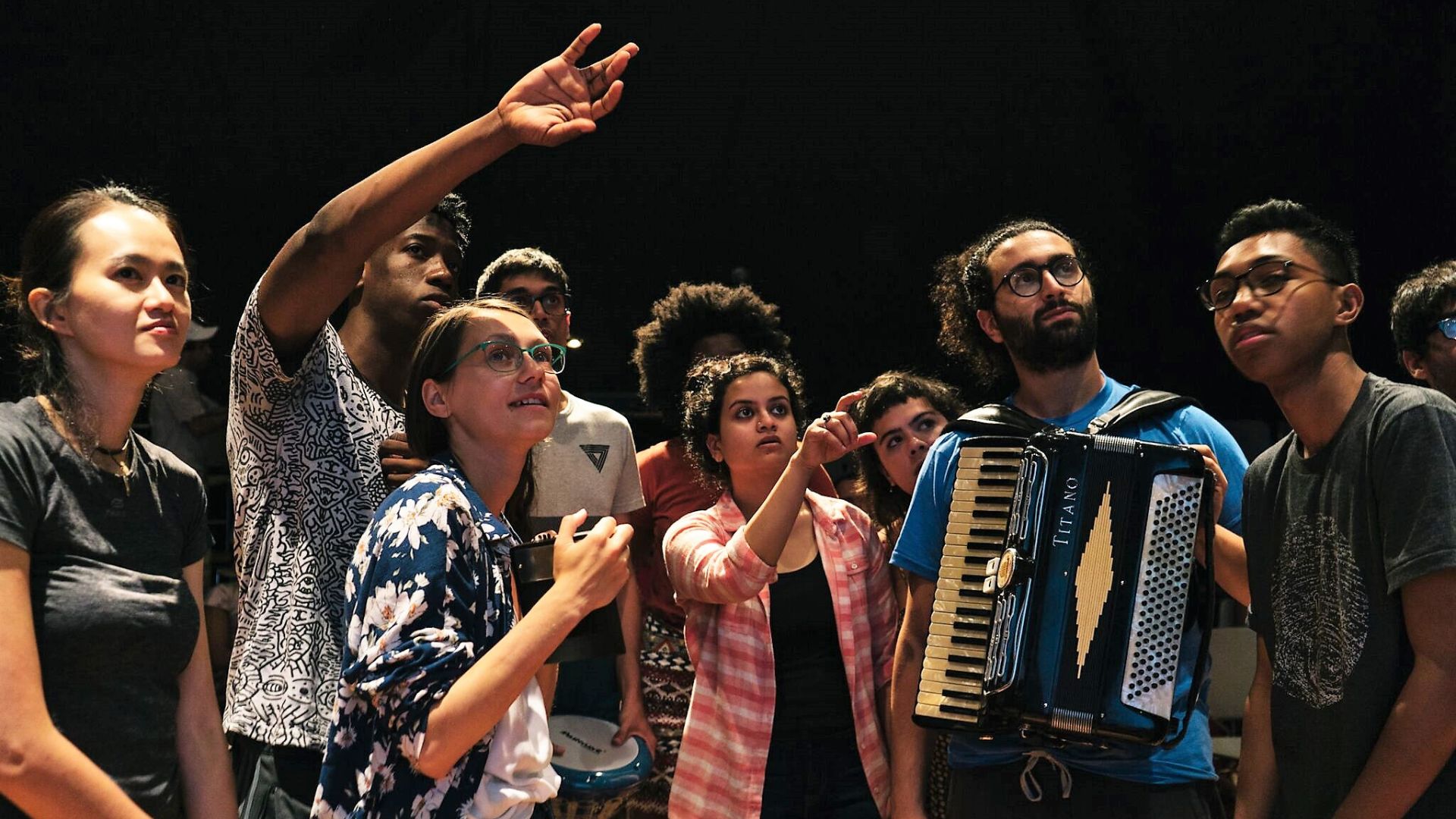The U.S. State Department’s OneBeat initiative brings together musicians from around the world to create original work and develop strategies for arts-based social engagement.
January 2019

OneBeat fellows on tour, with vocalist-composer Pavithra Chari (center). After incubating their projects, OneBeat fellows showcased their powerful collaborations on original music, touring cities in Florida, South Carolina, Maryland and Washington, D.C., before returning to New York City. (Photograph by Jacob Blumberg)
Music is a universal language. For proof, look no further than the international music exchange OneBeat, which brought together 24 outstanding emerging artistes from 17 countries to make music this fall. OneBeat participants or fellows, aged between 19 and 35, spent a month in the United States collaboratively writing, producing and performing original music. Charged with developing strategies for arts-based social engagement, the 24 fellows took a multi-state tour along the eastern coast of the United States, collaborating with local musicians, leading workshops with youth and engaging a wide array of audiences with their music. Bringing this work back to their home countries, the fellows then develop community-based music projects and join OneBeat’s global network of music-driven social enterprises.
Now in its eighth year, OneBeat is an initiative of the U.S. State Department’s Bureau of Educational and Cultural Affairs. It is produced by the New York-based music organization Bang on a Can, through its social engagement wing, Found Sound Nation. Nearly 200 OneBeat alumni spread across 48 countries have developed ways for music to make a positive impact on local and global communities.
“It has been like a dream come true,” says Aditya Alamuru, a OneBeat 2018 fellow from Bengaluru, “to create and produce songs in so many genres with extremely talented musicians from different cultures.” Alamuru relied on his experience as a music producer to put together recording material for an album in his OneBeat fellows’ group. Likewise, his ventures into hip hop and electronica earlier in his career, guided his work on song structure in a small group collaboration with two or three fellows.

OneBeat fellow Aditya Alamuru from Bengaluru, a music producer who has released two extended playlists of classic hip-hop and electronica, with a nod to Indian folk instrumentation, as MALFNKTION. Photo courtesy Found Sound Nation
Pavithra Chari, an accomplished Hindustani classical and cross-genre vocalist and composer based in New Delhi, says OneBeat provided her “an enriching experience collaborating with such a diverse group of musicians, each with his or her musicality and sensibilities.” After Chari used a specific South Indian konnakol style rhythm in a composition she created, “I invited a drummer and percussive dancer, both from the United States, to add their unique artistry to the piece. We were so happy with how it came about that we made a video, which will be released soon.”
“Collaborations can also be a matter of just showing up and seeing the magic happen on the spot,” says Chari, pointing to her work in a quartet that included herself along with an Algerian drummer, a Madagascar multi-instrumentalist and a clarinet player from Hungary. “Amazing innovations emerged through that piece.”
In 2018, OneBeat challenged the fellows with reimagining NASA’s 1977 Golden Record—the time capsule of rhythms, sounds and sights, considered to be humanity’s most meaningful sounds, launched into space aboard the Voyager spacecraft. The fellows were divided into three ensemble groups and directed to create music they might place in a second time-capsule of our 21st century world in response to the Voyager collection, which included a variety of natural sounds, music from different cultures and eras, and spoken greetings in different languages.
This challenge influenced both the creation and presentation of each group’s music. “It’s a chaotic time in the world with extremes happening, both great and terrible. We used sleep as our theme to create performance pieces, with nightmares that strangle sleep and lullabies that induce sleep coexisting. We found not just music and sound, but also body movement and dance helped convey our feelings on current times,” says Chari explaining the work created by her OneBeat group.
On tour, OneBeat utilized a variety of venues for their performances, ranging from auditoriums and art galleries to circular churches and pop-up street shows. The carefully-incubated music projects of each group were continuously adapted and extended for the space and the community they served.
Alamuru’s ensemble group created its pieces from the viewpoint of forgotten communities. After visiting neighborhoods in Charleston, South Carolina, which had lost many African American businesses, his group decided to take its audience on a tour of three separate spaces within the Redux Contemporary Art Center. The audience watched the group ensemble perform on the larger stage and then move to two smaller stages for fellows’ duos and trios. One of these presented a music video created by Alamuru and an American rapper based on their interviews of two 35-year-old owners of barbershops, who lost their business to gentrification.
It’s no doubt that OneBeat’s unique form of cultural diplomacy will be reflected in both Alamuru’s and Chari’s in-country projects. Chari wants to extend the focus of her fellows’ group on sleep and “the way cultures interpret sleep and the tradition of lullabies—the narrative, compositions and their presence in our upbringing.” She also defines another project she is considering: “A sonic perspective on privilege- how it’s perceived and accepted by people on both ends of the spectrum. I have a long way to go in the ideation, but I’m excited to see where it leads me.”
Alamuru will expand his already-established Music for All project, which teaches music production courses to youth through training on accessible mobile phone-driven software in his city. He also plans to travel to remote parts of northeast India, Rajasthan and Kashmir, to create music reflecting the heritage of local people.
Hillary Hoppock is a freelance writer, former newspaper publisher and reporter based in Orinda, California.
COMMENTS